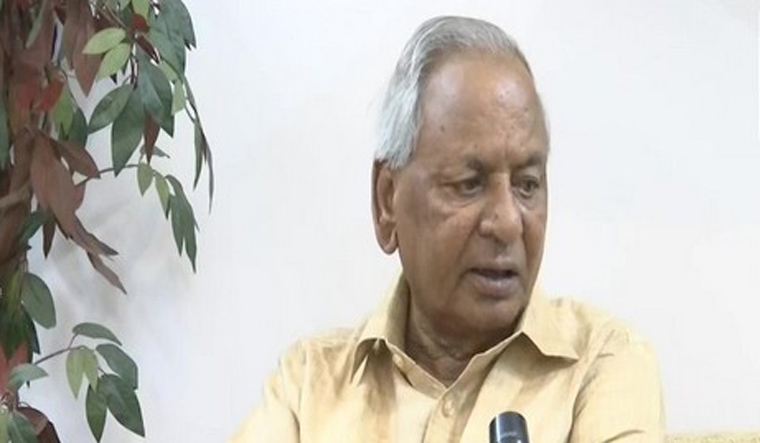Former Uttar Pradesh chief minister Kalyan Singh died on Saturday. He was 89.
Born in January 1932 in Atrauli in what was then the United Provinces of British India, Singh was a leader of the backward castes, most specifically the Lodhs. Singh was first elected to the Vidhan Sabha in 1967. He was jailed for 21 months during the emergency.
He had his first ministerial stint in 1997 when he became minister of state for health. From 1985 to 2002, he was an MLA for six terms. In 2004 and 2009, he was elected to the 14th and 15th Lok Sabha.
Singh had served as the state's chief minister from June 1991 to December 1992, and again from September 1997 to November 1999. He was the chief minister when the Babri Masjid was demolished. His government emphasised that all primary classes should begin the day with the worship of Bharat Mata and that ‘Vande Mataram’ should substitute 'Yes Sir' during role calls.
From 2014-19, he was the governor of Rajasthan and then served a brief stint in the same capacity in Himachal Pradesh. For days after his tenure ended, Singh was back in the folds of the BJP, raising questions about the constitutional propriety. He had then explained: "Politics is a means of serving the public. To retire from it means to retire from serving the public."
His gubernatorial terms had not been without controversy. During the 2019 Lok Sabha elections, Singh had attracted criticism for asking for votes for the BJP despite occupying a constitutional position which called for political neutrality.
In the 1990s, as Singh’s stature in the BJP grew, the party itself was undergoing a massive churn and ideological shift. It when sometime in 1995 that the party first came up with the idea of a 'coalition of the extremes', by considering an alliance with Mayawati. Singh remained staunchly opposed it as it would have put in a shadow the group he represented: the Other Backward Castes. Though Singh did accept the party’s decision, his rift with the group of Kalraj Mishra, the upper caste group, widened.
Ideologically, Singh had never been a votary of the rights of the Scheduled Castes. He had, in fact, joined hands with Mulayam Singh Yadav to denounce the victimisation of the OBCs at the hands of the SCs.
The effects of the close collusion of Singh with OBCs became clearer as he moved from his first government to the second. In the 1991 cabinet, almost 89 per cent of the posts went to upper castes. In 1999, it was the OBCs who held most ministerial posts. Meanwhile in 1997, he had cornered Kalraj Mishra by engineering a coup, causing many defections from the BSP, the Congress and the Janta Dal, and the BJP could form a government without external BSP support. This left in tatters the coalition of the extremes that the party had hoped to engineer.
Within the party, he deliberately gave the chunk of posts to his caste men; outside it, he was promoting himself as a leader of the OBCs.
Ever the maverick, in 1996, Singh turned a vociferous opponent of quotas for women in elected bodies, driven by the fear that this would reduce the chances for OBC women. He also initiated talk for a coalition of OBCs across party lines to push for a quota for OBC women.
In 1999, alleging that he was being sidelined by the party’s high command, Singh floated a new political outfit Rashtriya Kranti Party (RKP). The party contested the 2002 state assembly elections and had three victories. Later, RKP had an alliance with the SP, and Kalyan's son Rajveer held the portfolio of health minister in Mulayam Singh Yadav's regime. By 2004, Kalyan Singh had a change of heart, denounced Mulayam Singh Yadav as an "opportunist" and he went back to BJP, announcing RKP's merger with it.
In 2009, Singh did another somersault, and went back to the SP. The coming together did not last.
Singh was among the most prominent faces of the Ram Mandir movement.
The end of his term as governor also took away his immunity, and he had to stand for trial in the Babri Masjid demolition case. All accused were acquitted. Singh’s grandson Sandeep is minister for state for basic education in the state government.





